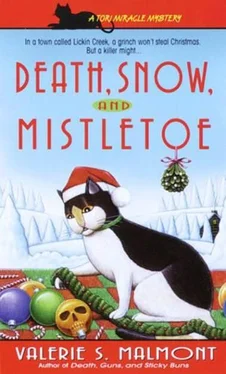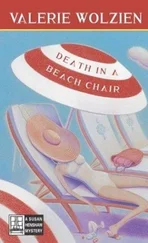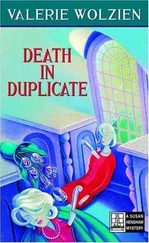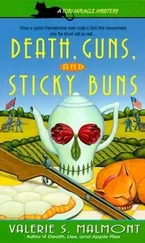After I threw another log on the fire, I tried to call Greta's house, but apparently the phone lines had finally gone down. I wondered how much longer this storm could go on, and once again, I longed for the comfort of a portable radio.
Noel came out from under the table and gave me one of her looks that called me a “stupid human.”
“What's wrong?” I asked her. She answered by strolling out of the room with her twitching tail straight up. I followed her into the front hall, and from there I heard the sound of someone or something pounding on the front door.
I stood close to the door and yelled, “Is someone there?”
“It's me. Ginnie.” I could barely hear her voice over the roar of the wind.
I unbolted the door, and it blew open, admitting Ginnie Welburn and a lot of snow. The porch creaked ominously as I shut the door as gently as I could. Noel screeched and ran from the hall.
“I tried to call you a little earlier,” I said.
“I came straight from Greta's. I have something I wanted to give you.” I noticed she had a plastic-wrapped bundle tucked under one arm.
“You shouldn't have… I didn't get you a present,” I protested.
“It's not really a present. But don't open it until tomorrow, please.” She placed it on the hall table, hung her parka on the hall tree, and went into the living room.
“What a lovely fire.” She was rubbing her hands together in front of the fireplace.
“You look frozen. I'll get some tea,” I offered. When she didn't say anything, I hurried back to my frozen kitchen. The water in the kettle was still hot, so it took only a minute or two to come to a boil. I refilled the teapot, grabbed another mug, and went back to the living room, where Ginnie was seated on the couch reading Death in the Afternoon.
I filled two mugs with tea and put one down beside her. She flipped quickly through the pages and didn't seem to notice me.
Fred crawled out from under the table and curled up on my lap. I sipped my tea, which burned all the way down.
“So she did give you a copy,” she said.
“She didn't exactly give it to me. She sort of left it here for me to find.”
“I figured that's why she came down here after leaving my house.” Ginnie tossed my copy of the play onto the coffee table. “The day after we learned Kevin Poffen-berger was lost.”
“The reason she gave me for dropping in was she wanted me to lizard-sit an iguana until she could find a home for it. Now I can see that was just an excuse to leave the play here. But I didn't see it until Sunday night when Praxythea packed up to leave and took the iguana with her.”
“That explains a lot.” Ginnie sipped from her mug of tea. “Have you read it?”
I said quietly, “Yes, Eugenia, I read it tonight.”
Ginnie jumped up and started pacing the length of the room. Back and forth, and back again. Fred, startled, jumped from my lap and ran from the room.
When Ginnie spoke, her words sounded almost childlike. “Eddie and I were twins, you know. Like one spirit with two bodies. Always together. If I hadn't had a summer cold, I would have been with him that day. And he wouldn't have gotten lost. Mummy said it was my fault he got lost.
“I tried to put it out of my mind. For years, I hadn't thought about it. Then Eddie's body turned up in the quarry, and I read Oretta's play, and everything flooded back. Eddie's disappearance. Mummy drinking. And crying all the time. The fighting. The shots. Finding Daddy and Mummy in the bedroom. All covered in blood.
“They took me away to live with another family. There was a terrible man there. He did things to me in the barn-it all came back.
“I called Oretta. Told her it was a great play. When I asked her if it was ‘autobiographical,’ she was stupid enough to tell me it was-that she'd done something as a child she regretted, and writing about it was her way of getting it off her conscience.”
“Why didn't you go to the police with it?” I asked.
“I couldn't have proved she'd really killed my brother, and even if they believed me, she'd never have been punished enough. They'd have figured it all happened a long time ago, when she was only a child. At the most, she'd have been given a lecture and maybe a short sentence, suspended of course. She deserved to die.”
“Did Bernice deserve to die?”
She began to cry. “I didn't mean to kill her.” Her pacing was more rapid now. Up and down, back and forth. “As you guessed, it was meant for Oretta. I felt terrible when Bernice drank it and died.”
“Where did you get the cyanide?”
“In the back of a locked closet in the high school lab where I sub. Years ago, cyanide was used for some science experiments involving the synthesis of complex molecules, but schools were supposed to have disposed of it.” She half-smiled as if she'd heard a bad joke. “Most likely the science teacher didn't know how to get rid of it, so he locked it up and forgot about it. Nobody knew it was there. After I read her play and decided to kill her, I remembered the cyanide. I went over to the school and helped myself. A few students saw me, but they had no idea what I was doing.”
“I'm going to have to call the police, you know,” I said.
She stopped pacing and hovered over me, and I became frightened although I tried not to show it.
“You can't call anyone. The phone lines are down.”
I knew I had to keep her talking. As long as she was talking, she wasn't hurting me. “With all the painful memories Lickin Creek holds for you, I'm surprised you came back here to live,” I said. “Why did you?”
The pacing started again. “What I told you about driving through with my husband on our way to Gettysburg was true. There was something about the town that appealed to me. I instantly felt as if I belonged here. I didn't remember that I'd lived here before. After all, I was only five years old when it happened. It wasn't until I read Oretta's play that I realized that this was the town, and the reason I felt so comfortable here was because this was the last place where I'd actually been happy-before Eddie disappeared and my life ended.”
“Why did you threaten me?” I asked, recalling the disemboweled bean-bag kitty that had been left on my doorstep. “What have I ever done to you?”
She stopped abruptly and knelt beside me. “Oh, no! Tori, you're the best friend I have in the whole world.” She seized my hand and rubbed her face with it. “I wouldn't really have hurt your cat. It was just that you were asking so many questions, and I knew it was only a matter of time before you remembered me serving cider to Bernice. And once you'd read Oretta's play, I was sure you'd figure the whole thing out. I only wanted to scare you so you'd go back to New York.”
Ginnie got to her feet and walked over to the fireplace. With her back to me, she said, “I need to go home for about half an hour. Put some things in order. Then I promise I'll go to the police station and turn myself in. Will you give me that time?”
I no longer feared her. I believed her when she said I was her best friend. But I was grappling with a new worry, Raymond Zook's safety. According to what I read, he had nearly as much to do with Eddie's death as Oretta. If I let Ginnie go off alone and she killed him, it would be my fault.
“I can't let you go,” I said.
As if she could read my mind, Ginnie said, “I'm through killing, Tori. I'll never hurt anyone again.”
I shook my head. “I'm sorry.”
She spun around, and I had only a brief moment to notice the light reflecting off the poker in her hand before she swung it at my head. It connected with my skull with a horrible crack I'll never forget, and I collapsed in a blur of pain. I might have lost consciousness for a minute or two.
Читать дальше












